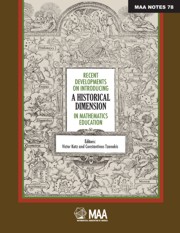Book contents
- Frontmatter
- Preface
- Contents
- 1 Teaching with Primary Historical Sources: Should it Go Mainstream? Can it?
- 2 Dialogismin Mathematical Writing: Historical, Philosophical and Pedagogical Issues
- 3 The Process of Mathematical Agreement: Examples from Mathematics History and an Experimental Sequence of Activities
- 4 Researching the History of Algebraic Ideas from an Educational Point of View
- 5 Equations and Imaginary Numbers: A Contribution from Renaissance Algebra
- 6 The Multiplicity of Viewpoints in Elementary Function Theory: Historical and Didactical Perspectives
- 7 From History to Research in Mathematics Education: Socio-Epistemological Elements for Trigonometric Functions
- 8 Harmonies in Nature: A Dialogue Between Mathematics and Physics
- 9 Exposure to Mathematics in the Making: Interweaving Math News Snapshots in the Teaching of High-School Mathematics
- 10 History, Figures and Narratives in Mathematics Teaching
- 11 Pedagogy, History, and Mathematics: Measure as a Theme
- 12 Students' Beliefs About the Evolution and Development of Mathematics
- 13 Changes in Student Understanding of Function Resulting from Studying Its History
- 14 Integrating the History of Mathematics into Activities Introducing Undergraduates to Concepts of Calculus
- 15 History in a Competence Based Mathematics Education: A Means for the Learning of Differential Equations
- 16 History of Statistics and Students' Difficulties in Comprehending Variance
- 17 Designing Student Projects for Teaching and Learning Discrete Mathematics and Computer Science via Primary Historical Sources
- 18 History of Mathematics for Primary School Teacher Education Or: Can You Do Something Even if You Can't Do Much?
- 19 Reflections and Revision: Evolving Conceptions of a Using History Course
- 20 Mapping Our Heritage to the Curriculum: Historical and Pedagogical Strategies for the Professional Development of Teachers
- 21 Teachers' Conceptions of History of Mathematics
- 22 The Evolution of a Community of Mathematical Researchers in North America: 1636–1950
- 23 The Transmission and Acquisition of Mathematics in Latin America, from Independence to the First Half of the Twentieth Century
- 24 In Search of Vanishing Subjects: The Astronomical Origins of Trigonometry
- About the Editors
17 - Designing Student Projects for Teaching and Learning Discrete Mathematics and Computer Science via Primary Historical Sources
- Frontmatter
- Preface
- Contents
- 1 Teaching with Primary Historical Sources: Should it Go Mainstream? Can it?
- 2 Dialogismin Mathematical Writing: Historical, Philosophical and Pedagogical Issues
- 3 The Process of Mathematical Agreement: Examples from Mathematics History and an Experimental Sequence of Activities
- 4 Researching the History of Algebraic Ideas from an Educational Point of View
- 5 Equations and Imaginary Numbers: A Contribution from Renaissance Algebra
- 6 The Multiplicity of Viewpoints in Elementary Function Theory: Historical and Didactical Perspectives
- 7 From History to Research in Mathematics Education: Socio-Epistemological Elements for Trigonometric Functions
- 8 Harmonies in Nature: A Dialogue Between Mathematics and Physics
- 9 Exposure to Mathematics in the Making: Interweaving Math News Snapshots in the Teaching of High-School Mathematics
- 10 History, Figures and Narratives in Mathematics Teaching
- 11 Pedagogy, History, and Mathematics: Measure as a Theme
- 12 Students' Beliefs About the Evolution and Development of Mathematics
- 13 Changes in Student Understanding of Function Resulting from Studying Its History
- 14 Integrating the History of Mathematics into Activities Introducing Undergraduates to Concepts of Calculus
- 15 History in a Competence Based Mathematics Education: A Means for the Learning of Differential Equations
- 16 History of Statistics and Students' Difficulties in Comprehending Variance
- 17 Designing Student Projects for Teaching and Learning Discrete Mathematics and Computer Science via Primary Historical Sources
- 18 History of Mathematics for Primary School Teacher Education Or: Can You Do Something Even if You Can't Do Much?
- 19 Reflections and Revision: Evolving Conceptions of a Using History Course
- 20 Mapping Our Heritage to the Curriculum: Historical and Pedagogical Strategies for the Professional Development of Teachers
- 21 Teachers' Conceptions of History of Mathematics
- 22 The Evolution of a Community of Mathematical Researchers in North America: 1636–1950
- 23 The Transmission and Acquisition of Mathematics in Latin America, from Independence to the First Half of the Twentieth Century
- 24 In Search of Vanishing Subjects: The Astronomical Origins of Trigonometry
- About the Editors
Summary
Introduction
A discrete mathematics course often teaches about precise logical and algorithmic thought and methods of proof to students studying mathematics, computer science, or teacher education. The roots of such methods of thought, and of discrete mathematics itself, are as old as mathematics, with the notion of counting, a discrete operation, usually cited as the first mathematical development in ancient cultures [7]. However, a typical course frequently presents a fast-paced news reel of facts and formulae, often memorized by the students, with the text offering only passing mention of the motivating problems and original work that eventually found resolution in the modern concepts. This paper describes a pedagogical approach to teaching topics in discrete mathematics and computer science intended to place the material in context and provide direction to the subject matter via student projects centered around actual excerpts from primary historical sources. Much has already been written about teaching with primary historical sources [6, ch. 9]. Here we focus on a list of specific pedagogical goals and how they can be achieved through design of student projects based on primary sources.
Our interdisciplinary team of mathematics and computer science faculty has completed a pilot program funded by the US National Science Foundation, in which we have developed and tested over a dozen historical projects for student work in courses in discrete mathematics, graph theory, combinatorics, logic, and computer science. These projects have appeared in print [1], and are presently available through the web resource [3].
- Type
- Chapter
- Information
- Publisher: Mathematical Association of AmericaPrint publication year: 2011
- 10
- Cited by



